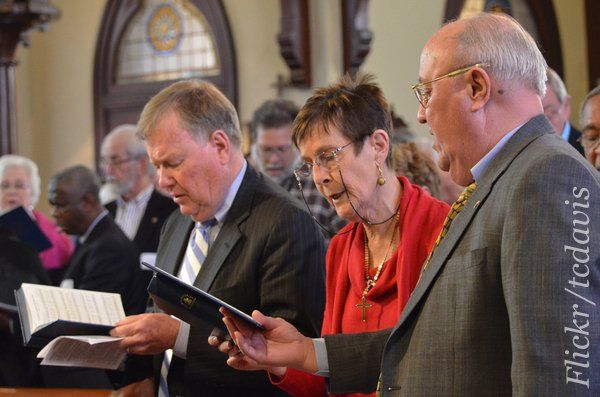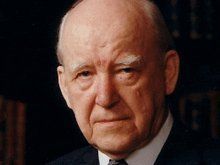On the day that I wrote this, British Railtrack have admitted that the Hatfield train disaster was caused by a broken rail. What was meant to guide the train safely to its destination, failed – with tragic results.
The rail broke because it was not maintained properly. This can be seen as a metaphor for changes which are taking place in Evangelicalism, in the UK and elsewhere, and which have become increasingly visible in the last ten years.
Glorifying God
Many who promote these changes believe that the train of progress is speeding (or at least chugging) safely onwards. Yet down the line may lurk a disaster which threatens, not our physical lives, but our eternal destinies, which are far more important.
Evangelicalism needs to change. I do not deny that. The only century in which we have any right to be ‘stuck’ is the first: certainly not the twentieth, and even less so the nineteenth. But the changes need to be the right ones. The problem today is that people seem to paying less and less heed to whether we are safely on God’s track.
Some of us in the north-west of England recently organised a conference entitled ‘God’s glory – our joy: building biblical churches for the twenty-first century’. The conference was an attempt to draw attention to a real concern.
Our worry? Reformed Evangelical Christians are less concerned about God being glorified in our churches than we used to be. His glory is not our chief joy; increasingly, it is not even taught that it ought to be.
We are becoming increasingly concerned with what pleases man – either believers, or outsiders. To use a fresh metaphor, we have taken our eye off the ball. This is an all-pervasive attitude. What follows are just examples.

Less sure
Firstly, at different Reformed conferences, and in Evangelical journals with a basically Reformed ethos, one is increasingly less sure these days about what one is going to hear or read (ET is better than most!).
This change may make things more exciting, but it does not make them better. Several areas are of concern. Firstly, for one thing, there is a lessening commitment to the infallibility and authority of God’s Word.
For another (is this an effect, or is it a cause, of the first?), there is a looser moral line, a practical antinomianism. Our constituency is being infected by a new liberalism. The moral ground is shifting under our feet.
Secondly, there is less emphasis on the church than ever. The biblical view was regained at great cost by the stand taken by Martyn Lloyd-Jones in 1966 and subsequently.
He taught us that relationships between pastors are not enough – churches must stand and work together. Therefore, by implication, Evangelical churches must separate from mixed denominations.
This vision gave great impetus to the British Evangelical Council. Now, however, some see the ‘Essentially Evangelical’ movement as the way forward. ‘EE’ is a non-separatist movement of individuals. Am I alone in believing that to choose this route is the beginning of a return to ecumenical involvement?
Worship
Thirdly, worship is either deliberately (or at any rate in practice) considered as an activity whose object is to please the worshippers rather than God. This is a mistake which not even the Roman Catholics make. Nor did Cain make it. They came to God, or still come, on the basis of ‘sacrifice’, however tragically they misunderstand it.

Yet some ‘Evangelical’ churches today teach that Christians do not need to worship at all! In others, it is only singing which is now referred to as ‘worship’. Even so, what is sung is chosen to please the hearers, or to make the ‘service’ (service of whom?) ‘go’ (go where?).
This shift in emphasis results from the mistaken view that outward change is necessary (in this case, to what we sing) if inward growth is to occur. This is a fallacy. In singing, as in any other area of our life, we must begin with what pleases God, not with what pleases man.
Evangelism
Fourthly, evangelism has become increasingly the ‘be all and end all’ of church life. In supposedly Reformed churches, one can hear quoted with approval the old Arminian mistake – ‘the church exists for the benefit of those outside it’.
Surely, the church exists for the benefit of the One who has saved us, to the glory of his grace. Only inasmuch as our church life flows from this fundamental truth will evangelism find its proper place. Only then will the true motivation be present for wanting sinners to be won to Christ.
Where in the New Testament is organised, whole-church evangelism to be found? Worse, if our ‘programmes’ are designed to interest and captivate the outsider, how do we differ in principle from the Romanist churches that hold bingo after the mass? What is the difference between our attitude and Baalism?
Yes, we draw the lines in different places as to what we allow. But the principle is the same; growth in the size of the congregation is the goal and measure of success.

Heritage
Fifthly, there has been a downgrading of the importance and level of theological knowledge amongst preachers. It was distasteful when men used to boast publicly of reading systematic theologies or the Puritans. But it is a disaster when men now boast that they do not!
The rich theological heritage which Lloyd-Jones and the Banner of Truth helped us to rediscover is being thrown away. It is treated as something we have outgrown, an impediment to the ‘modern’, ‘relevant’ church that is supposed to sweep all before it in the twenty-first century.
Increasingly, congregations desire a pastor to be up-to-date before being rooted in timeless truths; to be friendly before being godly.
Repentance needed
The sum of all this is that we are becoming more concerned about ourselves and the world, and less about God and his Word. The key words have become ‘relevant’, ‘modern’ and ‘user-friendly’.
What we need is not relevance, but repentance; not modernisation, but mortification. As for being ‘user-friendly’ – fine, so long as we remember that the ‘consumer’ the church must satisfy is God. If we go on in this way, he will consume us in a quite different sense.
We need to hear God’s call to repentance. Have we not abandoned our first love? Is not the risen Christ outside some of our churches, knocking to be let in? Is he having fellowship with individuals, but not with the church, because it has made itself the reason for its existence?
Debate
Not all will agree with this analysis. Yet if different views on this issue cause Evangelicalism to fragment further into mutually exclusive parties, Satan will have won a great victory.
Sometimes, hard words need to be said by brother to brother – as Paul did to Peter, and as has been done in this article. Yet we are brothers still. The truth must be spoken, but it must be spoken in love.
Is it too much to hope that we can have a prayerful, biblically-reasoned debate on these issues? In our magazines, at our conferences and fraternals, and by personal communication? The need is urgent. If we do not address this matter soon, it will be too late.









